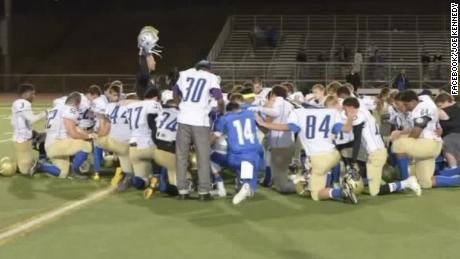The Supreme Court of the United States ruled on Monday morning that public high school football coach in the state of Washington had his First Amendment rights violated after he was placed on administrative leave by the school district and banned from participating in the football program for praying on the field after games in view of students. This was for the case Kennedy v. Bremerton School District.
“SCOTUS sides with a high school football coach in a First Amendment case about prayer at the 50-yard-line,” SCOTUS Blog tweeted Monday. “In a 6-3 ruling, SCOTUS says the public school district violated the coach’s free speech and free exercise rights when it barred him from praying on the field after games.”
SCOTUS sides with a high school football coach in a First Amendment case about prayer at the 50-yard-line. In a 6-3 ruling, SCOTUS says the public school district violated the coach's free speech and free exercise rights when it barred him from praying on the field after games.
— SCOTUSblog (@SCOTUSblog) June 27, 2022
Justice Neil Gorsuch authored the majority opinion:
“Here, a government entity sought to punish an individual for engaging in a brief, quiet, personal religious observance doubly protected by the Free Exercise and Free Speech Clauses of the First Amendment. And the only meaningful justification the government offered for its reprisal rested on a mistaken view that it had a duty to ferret out and suppress,” Gorsuch wrote. “Religious observances even as it allows comparable secular speech. The Constitution neither mandates nor tolerates that kind of discrimination.”
Bremerton High School Assistant Football Coach Joseph Kennedy, a Marine veteran, started a tradition of kneeling in prayer after games. This began back in 2008. Players began to join him in prayer.
An opposing coach filed a complaint which resulted in an investigation. The investigation resulted in Kennedy being placed on administrative leave and banned from “participating in any capacity in the BHS football program.”
“Kennedy’s private religious exercise did not come close to crossing any line one might imagine separating protected private expression from impermissible government coercion,” Gorsuch wrote Monday.
“Learning how to tolerate speech or prayer of all kinds is part of learning how to live in a pluralistic society, a trait of character essential to a tolerant citizenry,” the court continued.
Kennedy reacted to his victory in a press release Monday.
“This is just so awesome. All I’ve ever wanted was to be back on the field with my guys.”
“I am incredibly grateful to the Supreme Court, my fantastic legal team, and everyone who has supported us,” he continued. “I thank God for answering our prayers and sustaining my family through this long battle.”
Freedom of Prayer in School
The freedom to pray in school is something that has been hotly debated for many years. There are those who feel that prayer has no place in a public school, while others believe that prayer is an essential part of the educational process.
There are a number of Supreme Court cases that have addressed the issue of prayer in school. In 1962, the Supreme Court ruled in Engel v. Vitale that state-sponsored prayer in public schools was unconstitutional. This ruling led to a ban on organized prayer in public schools.
However, the Supreme Court has also ruled that students are allowed to pray on their own initiative as long as they do not disrupt the educational process. In addition, students are allowed to form religious clubs and meet on school grounds as long as they do not interfere with the operations of the school.
The freedom to pray in school is a complex issue, and there are a variety of opinions on the matter. However, the Supreme Court has ruled that prayer in public schools is constitutional as long as it does not interfere with the educational process.

